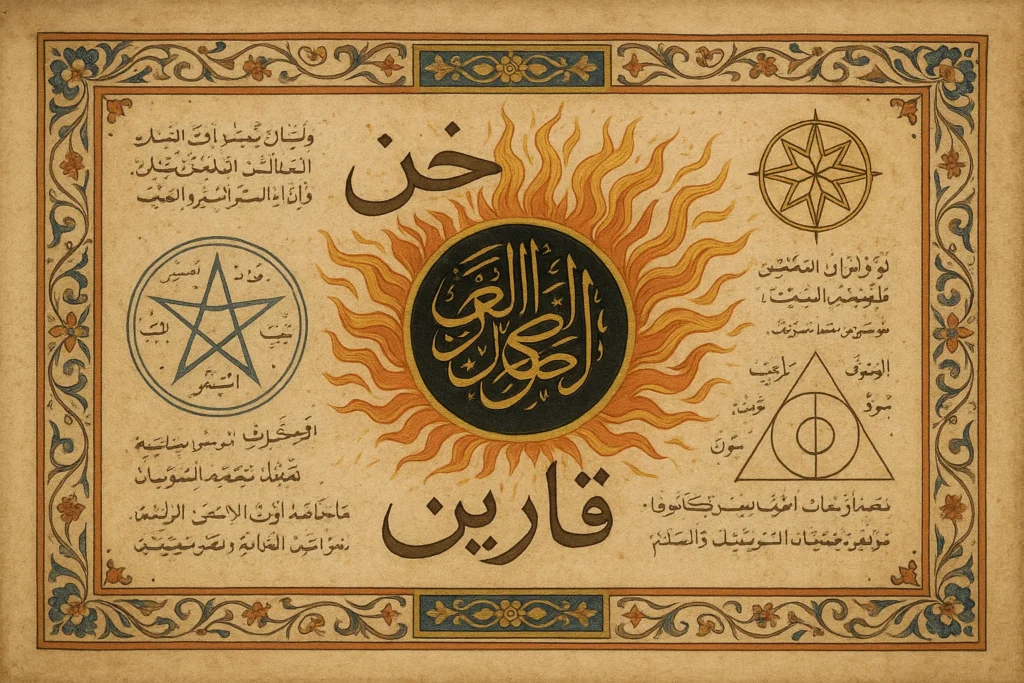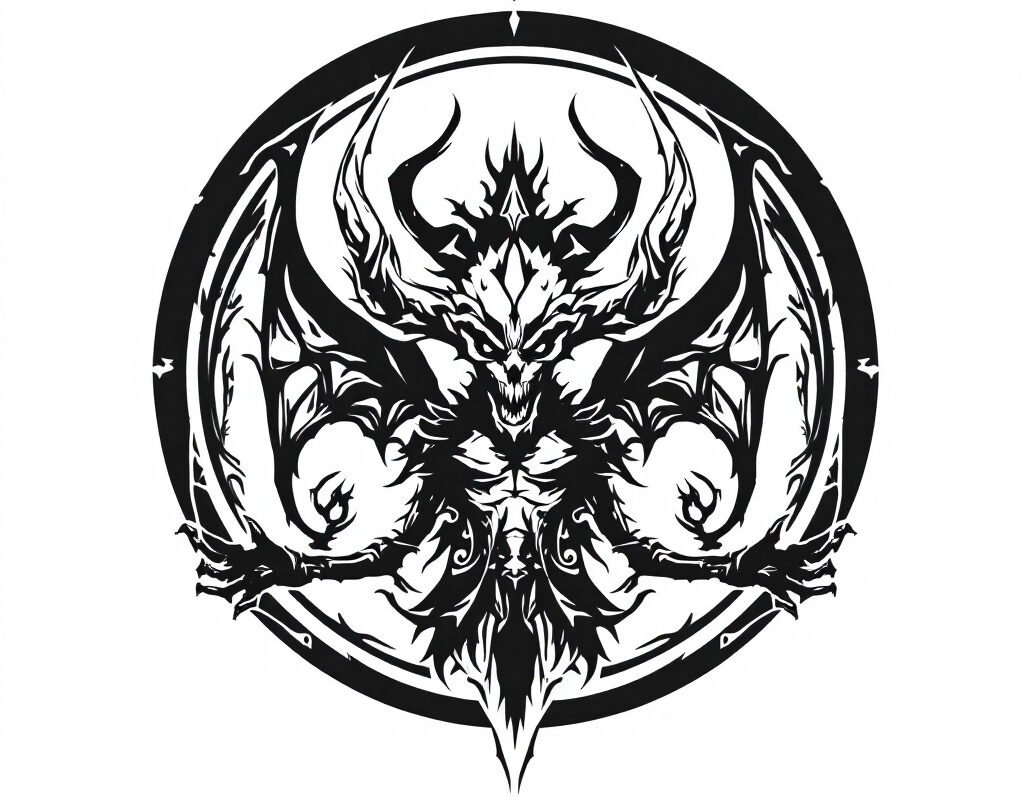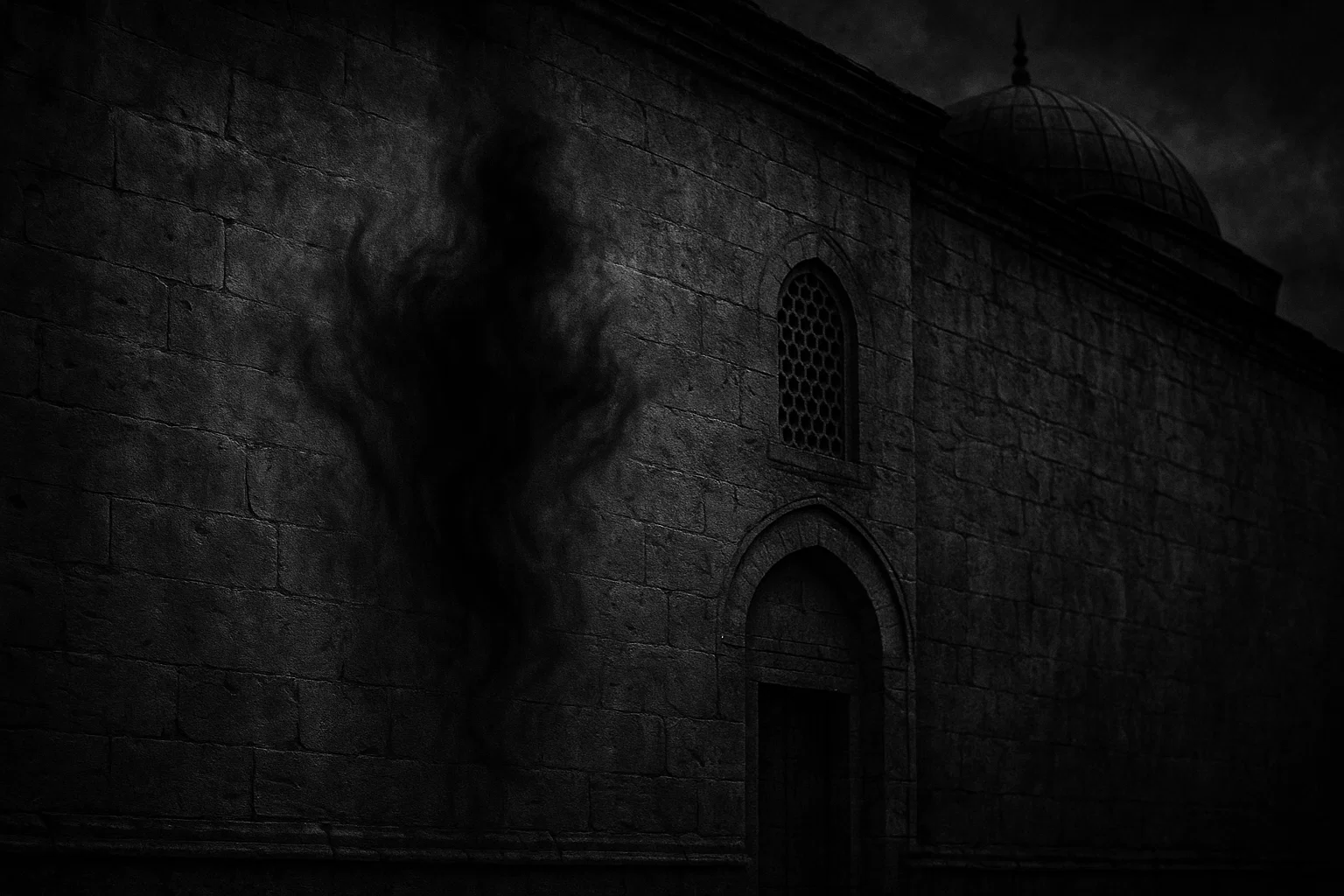Qarin is a supernatural entity in Islamic tradition known as a constant companion to every human being. This jinn acts as a spiritual double, often whispering bad ideas or urging people toward wrong actions.
While it can lead to harm, some sources suggest that it may have a positive outcome if the person follows their faith strongly. Qarin stays with a person from birth to death, shaping thoughts and choices in hidden ways.
In lore, Qarin comes from the world of jinn (beings made from smokeless fire before humans). It stands out because each one links to just one person, unlike other jinn that might roam free or live in groups. Stories from religious texts show how Qarin tests human will, but strong belief can weaken its hold.
Summary
Key Takeaways
| Attribute | Details |
|---|---|
| Names | Qarin, Qareen |
| Type | Companion Jinn |
| Title | None |
| Gender | Ambiguous |
| Servitors | None |
| Superior Jinn | Iblis |
| Powers | Whispers evil suggestions, tempts to sin, induces doubt |
| Appearance | Invisible, no specific physical description |
| Etymology | From Arabic “qarīn” meaning constant companion or linked |
| Associated Figures | Iblis, Prophet Muhammad, angels as good companions |
| Weaknesses | Repelled by Quran recitation, remembrance of God, Ayat al-Kursi |
| Opposing Holy Figure | Prophet Muhammad, Archangel Jibril |
| Social Structure or Tribe | Personal to each human, no tribal role |
| Followers/Tribe Size | None |
| Element | Fire |
| Planet/Zodiac | None specified |
| Color(s) | None specified |
| Number(s) | None specified |
| Crystal(s)/Mineral(s) | None specified |
| Primary Sources | Quran, Hadith Sahih Muslim, Sunan Ibn Majah |
“Qarin” Meaning
The name “Qarin” originates from Arabic roots associated with concepts of closeness and partnership.
In old Arabic, “qarīn” refers to something or someone that remains linked or joined—such as a close friend or companion. This aligns with the entity’s role as a lifelong shadow to humans, always near yet unseen.
Over time, the word grew in religious texts to mean a spiritual pair that shares a person’s path, pulling them toward choices—good or bad.
Scholars trace the term back to pre-Islamic times, where it described bonds in poetry or daily life.
In Islam, it took on deeper layers, often linked to tests of faith. Variations like “Qareen” show up in different dialects, but the core idea stays the same: a constant tie that can’t break.
The Qarin’s definition in religious works emphasizes its jinn roots, derived from fire, and its role in whispering doubts. Historical views evolved from simple companions in early tales to symbols of inner struggle in later writings. This shift demonstrates how cultures combined old beliefs with new faith principles, making the Qarin a key concept in understanding human flaws.
How to Pronounce Qarin in English
In English, say “Qarin” like “ka-reen,” with stress on the first part. The “qa” sound is a soft “k” from the back of the throat (similar to the sound in “Quran”). The “rin” rhymes with “seen.” Some say “qa-reen” to match Arabic tones.
What Does the Qarin Look Like?
Sources provide little information on this jinn’s appearance, as jinn typically remain hidden from human eyes.
No clear picture exists in main texts like the Quran or Hadith; instead, it’s seen as a shapeless force or shadow that blends with thoughts. Some folklore hints at it taking forms like smoke or faint shapes during weak moments, but these lack strong backing.
In rare tales, Qarin might appear as a dark outline or a whisper without a body, emphasizing its role over form. This lack of detail fits the jinn’s nature—made from smokeless fire, they shift and hide. Focus stays on its mind pull, not visual traits.
Old writings note it matches the person’s inner state, appearing twisted if urging harm, but no set image holds across stories.
Origins
The concept of “Qarin” originates from pre-Islamic Arabian beliefs, where spirits were believed to be paired with people as guides or testers.
Old poetry and tribal tales spoke of invisible mates that shaped fate, often tied to stars or family lines. These early views regarded such beings as neutral, with their influence helping or hindering based on the rituals. As Islam spread, these concepts merged with new teachings, transforming Qarin into a tool for moral education and guidance.
In tribal times, genies in songs and stories acted like personal shadows, whispering secrets or tricks to those who sought them. Bedouin groups believed in spirit bonds from birth, which were linked to the desert winds or fires.
This base grew when Islam reframed jinn as God’s creations with free will, some following Iblis in rebellion. Qarin became a symbol of this split, urging the wrong, while angels pushed the right.
Over the centuries, the concept evolved in scholarly works, blending with ideas from neighboring lands, such as Persia or Egypt. Thinkers like al-Ghazali saw it as part of the soul’s fight, using it to explain why people stray. This shift made Qarin a key figure in faith talks, highlighting human weakness in the face of unseen forces.
You may also enjoy:
Yuki Onna: The Terrifying Demon Bride Who Feeds on Travelers
December 9, 2025
The Ghul: The Flesh-Eating Demon of Arabian Folklore
October 1, 2025
Abadir: The Demon Servant of Chaos and Dispersion
September 30, 2025
Who Is Abalam in Demonology? The Terrifying King That Serves Paimon
September 30, 2025
Who Is Shiva, the Destroyer and the Lord of the Universe?
November 12, 2025
Who Are the Yaksha, and Why Did Buddhists Fear Their Wrath?
October 20, 2025
Was Qarin Ever Mentioned in the Quran or Hadith?
Yes, Qarin appears in the Quran and Hadith, often as a companion tied to judgment or temptation.
In the Quran, it appears in verses about the afterlife and warnings against disregarding God. For example, in Surah az-Zukhruf, it warns that forgetting the Merciful leads to a devil as a close mate. Hadith expands on this, with the Prophet noting that every person has a devil companion. Still, his own turned good through divine help.
Interpretations vary. Yusuf Ali’s translation emphasizes the intimate bond, while modern ones focus on the devil’s role in misleading. In theology, this underscores the concept of free will—humans choose despite the whispers. Variations in wording across versions show a focus on context over exact terms.
| Source | Quote |
|---|---|
| Quran 43:36 | And whosoever turns away blindly from the remembrance of the Most Gracious (Allah) (i.e. this Qur’an and worship of Allah), We appoint for him Shaitan (Satan – devil) to be a Qarin (a companion) to him. |
| Quran 50:27 | His companion (Satan devil)] will say: “Our Lord! I did not push him to transgression, (in disbelief, oppression, and evil deeds) but he was himself in error far astray.” |
| Quran 41:25 | And We have assigned for them intimate companions (in this world), who have made fair-seeming to them, what was before them (evil deeds which they were doing in the present worldly life and disbelief in the Reckoning and the Resurrection) and what was behind them (denial of the matters in the coming Hereafter as regards punishment or reward). And the Word (i.e. Our Decree regarding their punishment) is justified against them as it was justified against those who were among the previous generations of jinn and men that had passed away before them. Indeed they (all) were the losers. |
| Sahih Muslim 2815 | Abdullah b. Mas’ud reported that Allah’s Messenger said: There is none amongst you with whom is not an attache from amongst the jinn (devil). They (the Companions) said: Allah’s Messenger, with you too? Thereupon he said: Yes, but Allah helps me against him and so I am safe from his hand and he does not command me but for good. |
| Sahih Muslim 2814 a | ‘A’isha the wife of Allah’s Apostle, reported that one day Allah’s Messenger came out of her (apartment) during the night and she felt jealous. Then he came and he saw me (in what agitated state of mind) I was. He said: A’isha, what has happened to you? Do you feel jealous? Thereupon she said: How can it be (that a woman like me) should not feel jealous in regard to a husband like you. Thereupon Allah’s Messenger said: It was your devil who had come to you, and she said: Allah’s Messenger, is there along with me a devil? He said: Yes. I said: Is devil attached to everyone? He said: Yes. I (Aisha) again said: Allah’s Messenger, is it with you also? He said: Yes, but my Lord has helped me against him and as such I am absolutely safe from his mischief. |

Qarin in Grimoires and Other Texts
Qarin rarely shows in occult works beyond core Islamic texts. Grimoires (like Shams al-Ma’arif) focus on magic squares, divine names, and jinn calls, but lack direct nods to Qarin as a summonable entity. Authors like Ahmad al-Buni dealt with broader jinn lore, but Qarin’s personal tie made it less fit for group rituals or spells.
Powers and Abilities
The Qarin is not a powerful jinn (at least not when compared to other jinn or demonic entities). However, it can still influence a mortal’s decisions, leading to corruption and the damnation of the soul.
Qarin’s powers and abilities include:
- Potential for Benevolence: While primarily a source of temptation, the entity can become a force for good if its influence is countered by strong belief and moral conviction, as exemplified by the Prophet. In such instances, the individual’s steadfast faith can transform the entity’s role, leading it to support and reinforce positive actions and decisions rather than undermine them.
- Whispers of Doubt: Subtly implants suggestions of sin and uncertainty into the mind of its human companion, often at critical moments when the individual is most vulnerable to temptation.
- Urges Disobedience: Encourages the individual to stray from their values and commitments, promoting rebellious thoughts against moral or spiritual guidance.
- Influences During Weak Moments: Exploits episodes of emotional instability, such as anger, fear, or despair, to manipulate thoughts and feelings. During these moments of weakness, the entity can amplify negative emotions, leading the person to make choices they would not consider in a state of clarity.
- Adaptive Presence: Maintains a persistent presence in the individual’s life, adjusting its tactics and insights to align with the evolving circumstances and choices of the person.
Influence on Humans and Possession
Qarin affects humans through quiet urges, rather than a full takeover, unlike some jinn. It plants seeds of bad ideas, like greed or hate, making them seem natural. Signs include sudden mood shifts, repeated poor choices, or feelings of guilt after certain actions. In lore, it grows stronger if ignored, leading to habits that harm oneself or others.
Possession by Qarin differs—it’s more of a deep bond than an invasion. Texts say it shares the soul’s space, blurring lines between one’s own thoughts and whispers. This can manifest as inner conflicts, where good urges clash with bad ones.
Over time, unchecked influence might cause stress, bad dreams, or loss of control in key moments. Folklore warns that grave sinners let Qarin dominate, turning life into a cycle of regret.
In theology, this setup tests free will, as humans decide whether to follow or resist. Stories highlight how prophets overcame it, showing victory through prayer. Modern views associate it with mental health, but its roots remain in spiritual balance.
Protection and Exorcism Methods
Historical methods to guard against Qarin’s pull included reciting the Quran (such as Ayat al-Kursi) before sleep. People also used daily remembrance of God to weaken whispers. In old practices, supplications sought divine aid to turn the companion good, as with the Prophet.
Exorcism focused on faith boosts, not direct fights. Reciting specific verses aimed to ward off harm. These acted as shields in tales, not cures, stressing ongoing devotion over one-time fixes.
Qarin Myths, Legends, and Stories
Most narratives about Qarin are short and come from religious texts, focusing on the jinn’s role in testing humans. These tales warn of unseen influences and the power of faith.
The Assignment of Companions
The Most Gracious warns that those who neglect His remembrance are destined to have a devil as their constant companion. This malevolent presence influences their thoughts and actions, distorting their perception of right and wrong, and portraying immoral deeds as appealing and acceptable.
As a result, they are led astray in this world, becoming entangled in a web of misguided choices. This insidious bond not only seals their fate in this life but also mirrors the fate of past generations of jinn and humans who failed to heed the warnings and suffer the consequences of their ignorance.
When Judgment Day arrives, the stark reality becomes painfully clear, but it is far too late for regret or redemption.

The Devil’s Companion on Judgment Day
A sinner stands before the blazing fire, the heat wrapping around him like a shroud. His companion, witnessing the torment, speaks up with anxious urgency, “Our Lord, I did not compel him to stray from the path of righteousness; the choice of his own volition led him into darkness.”
The Lord’s voice resonates in the chamber, deep and unwavering. “Both of you are entwined in the consequences of your actions,” He decrees, wise and just. “For the truth that binds you has been etched long before your existence. No soul is unjustly harmed; each is accountable for the choices made along the journey of life.”
In that moment, the weight of their shared responsibility hangs heavy in the air, a stark reminder of the intricate balance between free will and the divine order that governs their destinies.
The Prophet’s Qarin Conversion
One night, A’isha, the beloved wife of the Prophet Muhammad, found herself feeling a wave of distress when he left their home for a time. When he returned, he immediately noticed her downcast expression and inquired gently if jealousy had taken hold of her heart.
A’isha openly admitted her feelings, reflecting on how challenging it could be for a wife to avoid such emotions when married to a man of such remarkable character and significance.
The Prophet, with his profound understanding, remarked that the devil had indeed made an attempt to disturb her peace. A’isha, curious and slightly amused, asked him if she was the only one affected by such external influences. He reassured her that everyone has their own inner adversary, alluding to the spiritual struggles that accompany human existence.
When she probed further, wondering if he, too, faced such challenges, the Prophet confirmed that he indeed had his own. However, he added with a sense of calm assurance that God provided him with divine support to guard against its dangers, effectively shielding him from the harm that such temptations could bring.
Qarin vs Other Jinn
| Jinn Name | Associated Traits/Influence | Rank/Origin | Key Traits/Powers |
|---|---|---|---|
| Ifrit | Mischief and strength | High rank in jinn hierarchy, Arabian folklore | Fire-based, shape-shifting, grants wishes but deceives |
| Marid | Rebellion and power | King-like, sea origins in Quran | Water-linked, defiant, fulfills commands under force |
| Ghul | Grave-haunting and trickery | Low rank, desert folklore | Eats dead, lures travelers, changes form |
| Shaitan | Temptation and disobedience | Follower of Iblis, Quranic | Whispers lies, leads to sin, invisible influence |
| Jann | Deception in wild places | Early jinn type, pre-Islamic | Snake-like, guards hidden spots, causes illusions |
| Sila | Seduction and harm | Female type, folklore | Shape-shifts to women, possesses, induces lust |
| Vetala | Possession of bodies | Undead-like, Indian-Islamic blend | Hangs in trees, animates corpses, spreads fear |
| Hinn | Weakness and animal forms | Lowest rank, Hadith | Dog or snake shapes, minor tricks |
| Nasnas | Half-body deformity | Mutant type, folklore | Jumps on one leg, frightens, incomplete form |
| Palis | Foot-licking harm | Desert dweller, tales | Licks soles to drain blood, causes sleep paralysis |
| Shiqq | Half-human monster | Deformed, Arabian nights | Attacks alone, incomplete body, preys on weak |
| Aisha Qandisha | Water seduction | Moroccan folklore, female | Lures men to drown, camel feet, possessive |
| Amir | Leadership over groups | Tribal chief, occult texts | Commands lesser jinn, grants knowledge |
| Zar | Possession rituals | Ethiopian-Islamic, group | Causes illness, demands music and offerings |
| Qutrub | Werewolf-like | Night prowler, folklore | Changes to wolf, eats graves, spreads disease |
Position Among Jinn
Qarin holds a unique spot in the jinn ranks, not fitting neatly into groups like kings or tribes.
It acts as a personal shaytan, tied to Iblis’s followers but linked only to one human. This makes it stand alone, without command over others or a place in wider societies. Texts portray it as a tool of temptation, positioned below Iblis, yet crucial in daily tests.
Relations with other jinn remain vague; they do not join packs or wars like Ifrits. Instead, it mirrors the human’s path—if the person resists, Qarin weakens, perhaps turning neutral. The Prophet’s case shows it can submit, setting it apart from fixed evil types. In lore, it interacts through whispers, not direct ties to peers.
This position highlights Qarin’s role in personal faith battles, not grand jinn politics. It ranks low in power but high in impact, always near yet unseen.

Mystical Correspondences
| Attribute | Details |
|---|---|
| Planet | None specified |
| Zodiac Sign | None specified |
| Element | Fire |
| Direction | None specified |
| Color | None specified |
| Number | None specified |
| Crystal/Mineral | None specified |
| Metal | None specified |
| Herb/Plant | None specified |
| Animal | None specified |
Qarin’s links to cosmic forces are thin in sources, but its fire element is tied to jinn creation from a smokeless flame. This reflects quick, burning urges that flare up doubts. No clear planet or zodiac sign fits, though some associate general shaytans with harsh signs like Scorpio for their intensity.
These ties help grasp Qarin’s dark side, showing how unseen pulls mimic cosmic chaos. Fire’s wild nature mirrors its whispers, urging disruption. Understanding this helps to see its role as a tempter, rooted in the balance of creation.
Summoning and Rituals
Old occult ways spoke of reaching one’s Qarin through quiet focus or special prayers, but details of this practice remain rare. Grimoires hint at circles or names to draw it out, yet stress risks without strong faith. Tools like incense or mirrors appeared in folklore to aid contact, but no steps are endorsed that would cause harm.
Bindings used divine words to curb its pull, like Solomon’s methods for other jinn. Commands aimed to turn it good, but texts warn against seeking power over it. These acts were for the devout, not for common use.
You may also enjoy:
Who Was Abezethibou, the Fallen Angel Who Opposed Moses?
October 1, 2025
Andrealphus: The Peacock Demon Who Twists Minds and Bodies
January 19, 2026
What Is the Abumi-guchi Yōkai and Why Does It Wait Forever?
October 22, 2025
Who Was Mahishasura, the Buffalo Demon Slain by Goddess Durga?
October 3, 2025
Who Is Shiva, the Destroyer and the Lord of the Universe?
November 12, 2025
Demon Alastor: The Grand Executioner of Hell
November 17, 2025

